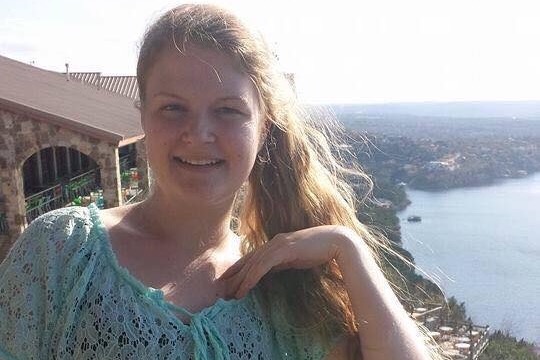 I am writing this on Christmas Eve. Today is the one-year anniversary of the last time I saw my granddaughter, Nicole.
I am writing this on Christmas Eve. Today is the one-year anniversary of the last time I saw my granddaughter, Nicole.
She was getting settled into a group home, where she had been released after several weeks at a a psychiatric hospital in Austin. She was on the waiting list for a bed at the state hospital, which would have been a long-term placement. We were all optimistic about that.
Unfortunately, a change in medical staff had prompted the psychiatric hospital to release all their existing patients. Because she was twenty-two, her family was not notified. I located her after a call to her therapist, and spoke to my son and daughter-in-law, who both live in Houston. We agreed I would take her to buy whatever she needed, and spend the afternoon and early evening with her.
Nicole began showing signs of mental illness when she was fourteen. Different psychiatrists offered different diagnoses, but finally settled on bipolar schizoaffective disorder. She sometimes heard voices, and at other times was paranoid. I remember a conversation with her when she was in another facility; she was sure the man sitting next to her in the dayroom planned to hurt her, and she was explaining this to me in a terrified whisper. It broke my heart to hear the fear in her voice, and to realize nothing I might have said could penetrate the wall of her delusion to comfort her.
During her mid-teens, she severely tested her parents’ commitment to her, and made her family’s life almost unbearable. She sowed chaos in every relationship. Through it all, her parents and her sisters forgave her, but I know she found it hard to forgive herself.
The thing I want you to know about Nicole is that she was much more than her diagnoses. She was so smart, and so funny. From early childhood, she loved practical jokes. She was an exceptional writer and poet. She felt injustice deeply, and she was passionate about people being treated fairly. She loved the outdoors, and the ocean. She loved the color pink She was full of love for her family, and deeply connected to her parents and her sisters.
When she was eighteen and living with her mother, she completed community college with an almost perfect grade point average. She wanted to become a therapist, and help other young people struggling with mental illness. She was accepted at several universities. When we went to visit Sam Houston State, they offered her a place in their program for high-performing students. We were so hopeful.
Then it all came tumbling down.
By the time the fall semester began, it was clear Nicole could not attend. She was trapped in a series of ever-increasing obsessive-compulsive behaviors. She would leave the house, and walk for hours. She was completely open to people, and seemed to have no sense of caution in protecting her personal safety.
Once she disappeared for several days, prompting us to use social media to try and find her. She borrowed a phone from someone and when her dad and sister went to get her, she was filthy and completely disoriented, saying a man had hurt her. At the hospital, she tested negative for drugs, but she was clearly traumatized. When my son asked the ER staff for a rape kit, they explained that they didn’t offer that to people who had been living on the street, because assault happened too often and it was impractical to locate the perpetrators.
My son had a demanding job, and he had to leave Nikki during the day. When it became clear that none of us could protect her, we turned for help to care homes, a network of privately owned facilities set up to serve the mentally ill. They are not regulated by the state, nor do they accept insurance. Needless to say, some were better than others. We visited every care home in advance, selecting the ones that seemed best. The last couple of years she went through a succession of placements, including more than dozen psychiatric hospitals.
In the American mental health system, resources are limited. Hospitals accept as patients people who are a danger to themselves or someone else. As Nicole’s life began to seem more and more unmanageable, her depression deepened. When she felt suicidal, she would go into the hospital for short-term therapy and medication adjustment. Insurance generally pays for seven to ten days of care. Once a patient is considered stabilized and no longer at immediate risk, he or she is discharged. Her life, and our lives, became a cycle of hospitalization and release and then, perhaps only a few days or weeks later, admission to another hospital.
Drugs were part of her life, intermittently when she was a teen, then gradually more often. Like so many mentally ill people, she resisted staying on the prescription drugs that might have provided more continuous relief, and instead self-medicated with street drugs. Her drug use made it more difficult to focus on treatment. Near the end of last year, we found an affordable treatment facility that provided both psychiatric care and substance abuse rehabilitation, and would take a patient on a long-term (in this case, thirteen months) placement.
We felt that kind of treatment offered her the best chance of getting better, and we encouraged her to consider it. She was fearful of being far away in another state, and not ready to truly commit to the process of getting better. I think she didn’t have confidence in her ability to get better. At the time of her death, we had decided to exercise a bit of tough love. That’s why, when I dropped her off after our day together, I left her rather than taking her someplace she might have been safer.
As we parted, I asked her again to think about entering the long-term treatment program. She said, “Oh, Gummy. I don’t need that. I’m not using drugs now.” When I called her an hour later, on the phone we’d just purchased for her, she was with new acquaintances and flying high. A week later, on New Year’s Eve, her body was found at the edge of a nearby wooded area. Austin police detectives believe she had been abducted, or perhaps got into a strange car willingly, and murdered by a person or persons still unknown.
So today is a hard day for me. Tomorrow is the anniversary of her final call to her mother and her older sister. Her younger sister still grieves the fact she was not there for the call.
New Year’s Day night around eleven o’clock, I got the call from APD Victim Services unit. They had identified Nicole from her fingerprints, and had my phone number from an earlier incident. On that occasion she had been visiting us, and had run into traffic, prompting us to call the police mental health unit to rescue her and get her into an ambulance. It took a minute for me to understand that this time, she was really gone. I kept repeating the words I heard in a shaking voice to my husband, trying to take them in.
Dempsey and I drove to Houston and woke my son. Together we told her mother and her sisters. The details of that day feel private, but let me just say, it was as bad as you might imagine.
When all that was over, I told my husband it had been the hardest day of my life. In a kind of black humor, my daughter-in-law and I began to rank the hard days. The day we finally saw her body was terribly hard. The funeral was comforting in many ways, planned by the family and attended by hundreds of people who loved us all, but it was a harder day yet. The very hardest was probably the day we drove down to the family cemetery and buried the pink urn that contained her ashes.
Never again will I take Nicole shopping, or out for a meal. She’ll never sit down again with me and tell me her secret thoughts. Never again will she show me her latest poem, or tease me when she finds me funny. Never will we go to the beach, or on a walk together. There will be no more long hugs when I can put my face next to hers and smell her particular fragrance.
Death is never easy for the people who remain, no matter the circumstances. The death of a young person is particularly poignant, since it takes away all our hopes for that person’s future here on earth. Yet death is everywhere. As reluctant as we are to accept it, there is no escape. We must find a way to come to terms with that reality, or live out the rest of our own lives crippled by grief.
I have no easy answers to offer, but I can share what I have found to be helpful. Today a friend who lost a baby daughter posted the quote that defines grief as love with no place to go. Nikki’s death has not lessened my ability to love. In fact, it’s as though my love keeps pouring out through the broken places. I am consciously choosing to continue to love, and no pain can stop that flow of love.
I am also consciously choosing to feel joy. That’s something we talked about as a family. Wherever Nikki is now, she still loves us and wants us to be happy. She wants us to live fully, to have fun and to go on adventures. I believe she is pleased knowing we honor her values and do good in the world.
That’s what keeps me going now: love and joy.
Tomorrow will be a hard day. New Year’s Eve, and New Year’s Day, will be harder still. Some of the family will visit Nicole’s grave and have a small ceremony. I plan on taking to my bed with a stack of books.
Knowing Nicole, and loving her, came at a steep cost, but I am grateful for the good days and the hard days. Through the years ahead, there will be more hard days. That’s the reality of life and death. And despite the pain, life is worth the price.
